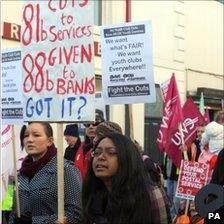Trade Unions face dilemma as they plan cuts protest
- Published

Royal Mail workers protest in David Cameron's constituency earlier this month
In public the union movement will put on a display of unity over its opposition to government cuts.
In private however there are deep disagreements among the unions over how best to defend their members.
In one corner are the big public sector unions.
They believe if the unions don't strike and show they are serious about resisting job losses then the government will see them as a walk over and simply press ahead with planned cuts.
They also hope that strikes will galvanise public opinion and chime with increasing public disquiet over the cuts.
PR 'catastrophe'
Indeed, Mark Serwotka of the Public and Commercial Services Union says action is now "inevitable." His union, he says, won't accept any cuts or any job losses. For him, the only question mark is over timing.
In the other corner however are the TUC and many of the smaller unions where there is serious disquiet about what such a campaign would achieve.
They point to the fact that it could well alienate public opinion, strengthen the hand of those ministers pressing for fresh anti-union legislation and prove a PR catastrophe.
There is also a doubt as to how willing union members - many in low paid jobs - would be prepared to come out on strike and thereby lose pay.
This in turn opens up the nightmare scenario for some general secretaries that they could ballot their members over strikes only to receive a resounding "No" vote.
This, it's argued, would severely weaken the unions' negotiating hand and give the government a green light to go even further with cuts and job losses.
Marginal constituencies
Paul Noon, the head of Prospect, which represents managers and professional workers puts it very simply. He says his union "is not about organising a public sector version of the miners strike".
Instead such unions are arguing for a more subtle strategy of seeking to build alliances with groups outside of the union movement. For example, they want to work with charities facing cuts, or residents opposing library closures or protesters unhappy at the sell off of forests.
The hope is this would build a much broader opposition to the cuts and have a much better chance of forcing the government to think again.
They also want to put pressure on Tory MPs in marginal constituencies in the hope that Conservative back-benchers might also be encouraged to oppose cuts in their own constituencies.
Of course, the two strategies are not completely incompatible. But the real fear of the more moderate voices is that their more cautious strategy risks being fatally undermined by strikes and bellicose language.
- Published28 January 2011
- Published16 January 2011
- Published28 January 2011